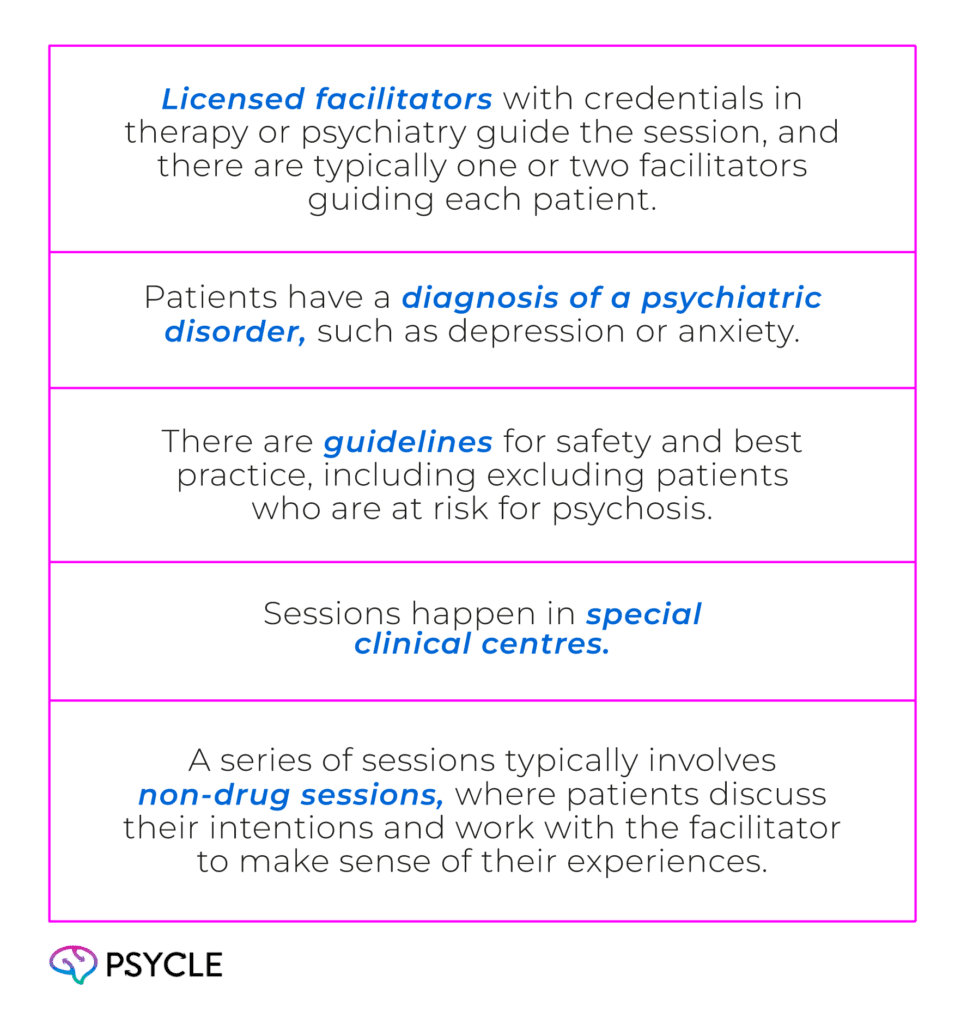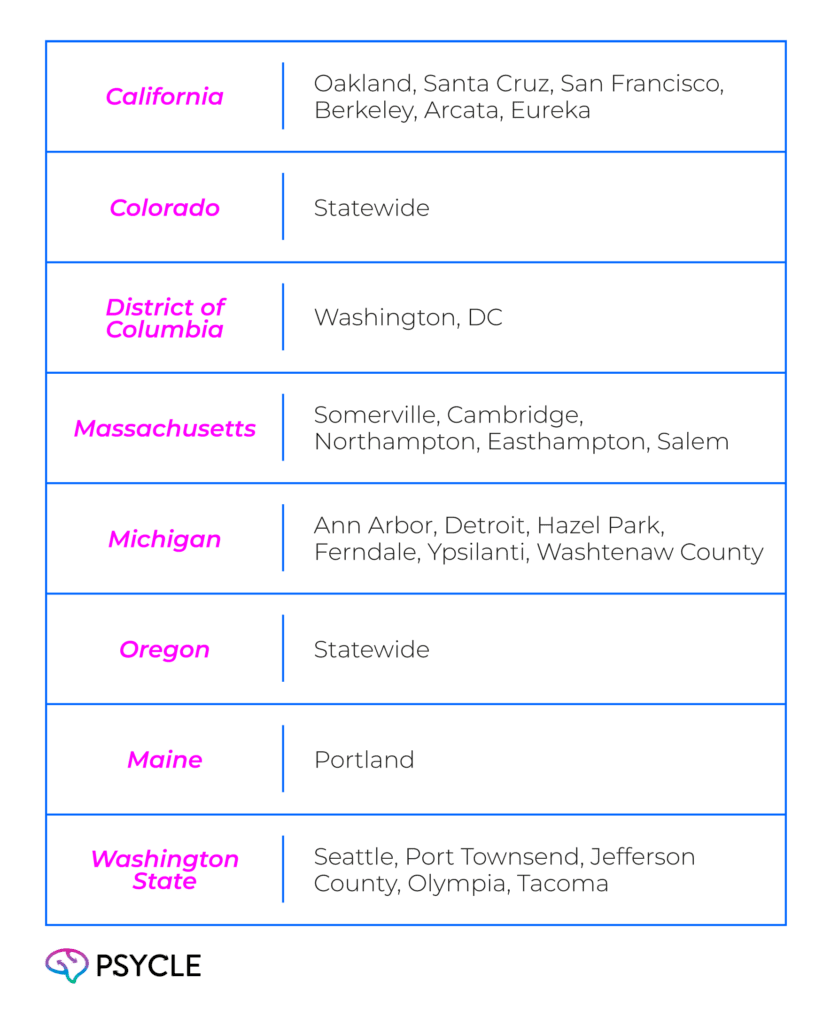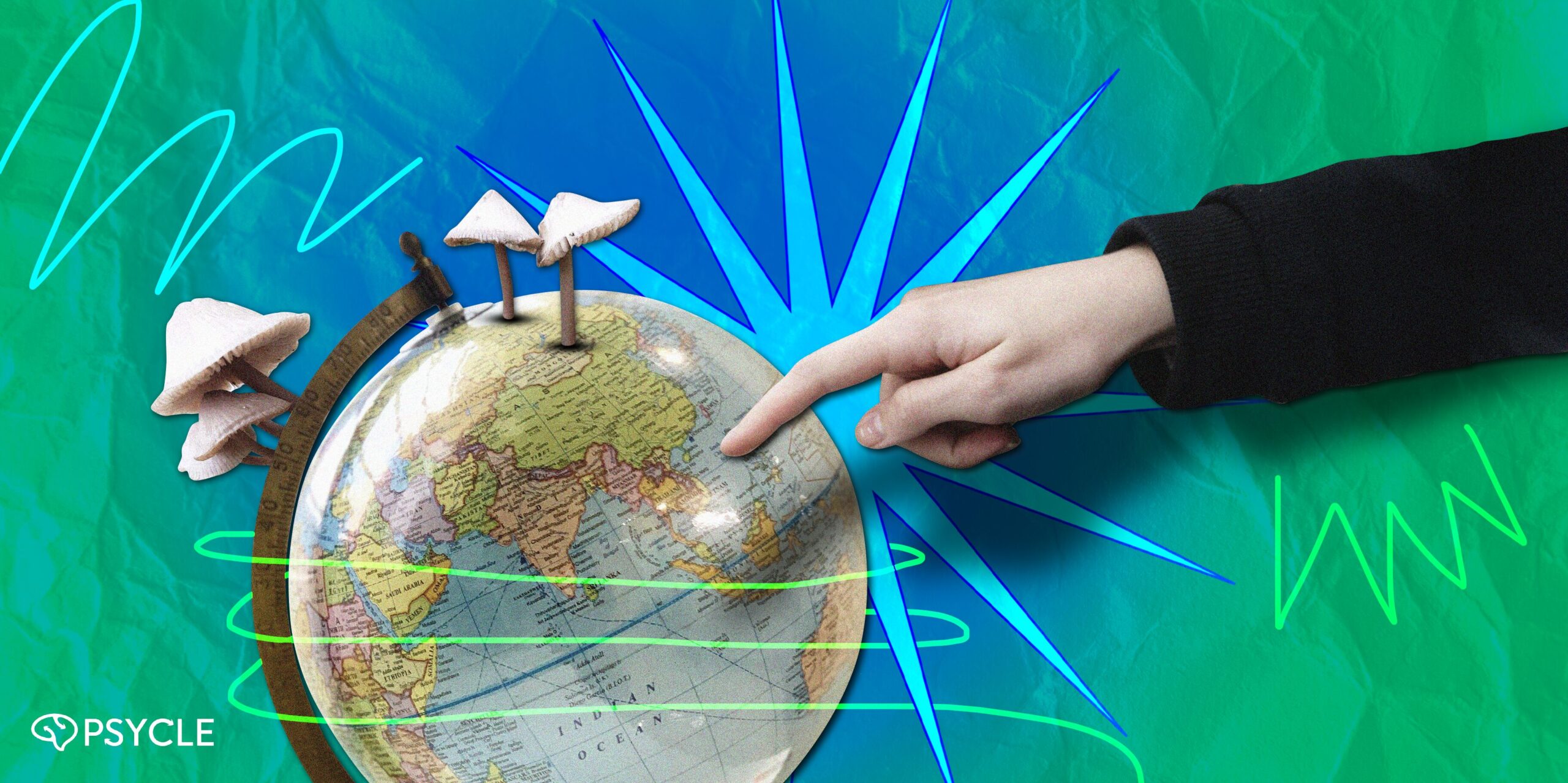Psychedelic-assisted therapy is rapidly gaining traction for clinical, personal, and spiritual use. Magic mushrooms, in particular, have become increasingly popular, driven by growing research highlighting their therapeutic potential. As a result, laws around magic mushrooms
This article will be an up-to-date guide on where mushroom therapies are officially legal and under what circumstances. We’ll examine the types of treatments available, including magic mushroom retreats, special access programs, and new state programs in Oregon, Colorado, and New Mexico.
@makingitez 🍄🍄 around the world… #trippy #thirdeye #🍄 #mushroom #mycology
♬ original sound – Making it EZ
Key Takeaways
- Oregon, Colorado, and New Mexico allow psilocybin use under different laws.
- Oregon offers legal sessions at licensed service centers.
- Colorado plans to have healing centers by 2025 and includes other natural psychedelics.
- New Mexico’s Medical Psilocybin Act starts full access by 2027.
- Psilocybin retreats are legal or tolerated in Jamaica, the Netherlands, Mexico, and Portugal.
- Medical therapy is approved in Australia, Canada, and Switzerland.
What is Mushroom Therapy?
Magic mushrooms contain psilocybin, a compound that alters perception and thinking. When used intentionally in a safe and controlled setting, experiences on magic mushrooms and pure psilocybin can be profoundly therapeutic. People may gain new insights into their lives, release deeply rooted emotions, and even have powerful mystical visions.
Cultures in Mesoamerica have long recognized the healing potential of magic mushrooms, and there’s historical evidence for healing mushroom ceremonies as far back as the Aztecs. However, it’s only in recent years that mainstream psychiatry has begun seriously exploring psilocybin for its benefits in mental health.
Modern clinical studies show psilocybin, along with therapeutic support, can give rise to long-lasting benefits for mental health patients, including those with treatment-resistant disorders.
Mushroom Therapy vs. Retreats
As the clinical use of psilocybin has grown in popularity, so have magic mushroom retreats. While both involve the supported use of psilocybin for healing, they are not the same.
Mushroom therapy uses a clinical model. This means:

Mushroom retreats are not clinical. They often happen in countries with relaxed drug laws or happen secretly. The focus is more on personal growth or spiritual healing than medical treatment. Some people attend these retreats for self-discovery, rather than therapy.
Retreats may include:
- Group ceremonies, involving multiple participants using mushrooms together. There may be multiple ceremonies over the course of a retreat, which can last from a weekend to a month.
- There are typically no requirements for facilitators, so they may or may not have specialist training in mental health. The number of facilitators holding a ceremony can vary.
- Retreats take place in a wide variety of settings, but are often situated in or near natural landscapes.
- Ceremonies typically incorporate elements of traditional indigenous practices, including songs, prayers, and the use of other natural herbs.
- Retreats can involve using more than one type of psychedelic. People may use other plant medicines like ayahuasca or peyote along with mushrooms or on different days.
On the whole, retreats are less regulated and more varied in their approach than therapy.
Is Mushroom Therapy Legal in America?
Under U.S. federal law, psilocybin and magic mushrooms are classified as Schedule I substances. That means the government considers them to be dangerous with no accepted medical use.
However, in recent years, multiple cities and states have decriminalized psilocybin, meaning people are unlikely to be prosecuted if they’re caught with small amounts of mushrooms. These places include:

Some states now also allow guided psilocybin sessions under new laws. Oregon, Colorado, and New Mexico are leading the way.
Mushroom Therapy in Oregon
Oregon passed Measure 109 in 2020. This created the Psilocybin Services Act. Under the act, adults aged 21 and over can use magic mushrooms and magic mushroom extracts in a licensed centre.
Facilitators must have an approved credential, and clients must have a preparation and integration session. Clients don’t need to have a mental diagnosis and can use the therapy for several mental wellness reasons, including personal development and spiritual growth.
The Oregon Health Authority began accepting license applications in January 2023, and around 27 centers are currently operating.
Mushroom Therapy in Colorado
In 2022, Colorado voters passed Proposition 122, also called the Natural Medicine Health Act. This law allows people over 21 to legally use and share magic mushrooms and other plant-based psychedelics.
The act also allows for licensed “healing centers” to offer supervised sessions of plant medicines, with guidelines similar to those in Oregon. Residents don’t need to have a mental health diagnosis and can use mushrooms for a variety of mental wellness reasons.
The state will also introduce “micro-healing centres” where mushrooms are used as an add-on to an existing therapeutic service.
There are currently five healing centres that have been established in Colorado, though they’re yet to be active.
Mushroom Therapy in New Mexico
In 2025, New Mexico passed Senate Bill 219, also called the Medical Psilocybin Act. It allows licensed medical providers to provide psilocybin therapy to adults with serious mental health conditions. This law focuses on medical treatment, not general use like Oregon and Colorado. New Mexico is the first U.S. state to use the word “medical” in its psilocybin law.
The New Mexico Department of Health is currently creating rules that are set to be finalized by December 2026. The state aims to start offering therapy by the end of 2027.
Where is Psilocybin Therapy Legal Across the World?
Several countries around the world have begun providing isolated psilocybin to mental health patients under certain conditions.
Australia
In July 2023, Australia became the first country to reclassify psilocybin as a prescription drug for people with treatment-resistant depression. The Therapeutic Goods Administration (TGA) controls access.
Canada
Psilocybin is a Schedule III drug. Medical use is allowed through the Special Access Program (SAP). This program allows licensed healthcare practitioners to request access to psilocybin for patients with serious or life-threatening conditions when conventional treatments are ineffective, unsuitable, or unavailable.
Switzerland
Switzerland allows limited access to psilocybin through a Special Authorization Program, which works similarly to Canada’s SAP.
Germany
Germany’s Central Institute of Mental Health (CIMH) recently received approval for the use of psilocybin as part of an expanded access program, similar to Canada and Switzerland. However, only patients with treatment-resistant depression (TRD) can participate.
Where Are Mushroom Retreats Legal Across the Globe?
Some countries allow mushroom or truffle retreats, often under different drug laws.
Amsterdam, Netherlands
Psilocybin mushrooms are banned, but magic truffles (which contain the same compound) are legal. Retreat centers run openly and legally. They offer weekend programs and spiritual ceremonies with trained guides.
Jamaica
Jamaica has no laws banning psilocybin. Retreats operate freely and offer multi-day experiences in nature. Many are located in rural parts of the island.
Portugal
Portugal decriminalized all drugs in 2001. Psilocybin is still considered Schedule II, but personal use is not punished. While it’s not fully legal, there are many retreat centres offering therapeutic mushroom journeys in the country.
Mexico
Mexico protects the use of mushrooms under indigenous rights laws. The Mexican Constitution defends cultural and spiritual traditions, which, for certain cultures, involve magic mushroom ceremonies.
The Future of Mushroom Therapy in the US
So far, the U.S. has taken a patchwork approach to legalizing and decriminalizing psilocybin. Some places have created official pathways for mushroom therapy, while others have only decriminalized personal use. States like Oregon and Colorado are leading the way and may serve as models for others looking to open healing centers.
Other states might choose a more medical route, especially as research grows around psilocybin’s use for mental health. New Mexico is already taking a clinical approach, and more states may follow. Current government officials have shown interest in psychedelics, so we could see major changes within the next five years.
Still, the future of mushroom therapy depends on more than just legal changes. There’s a need for strong training programs, clear ethical guidelines, and protections for patients to make sure this promising form of therapy grows safely and responsibly.
Sources
- https://psyclehealth.com/psychedelics/where-is-psilocybin-legal/
- https://psychedelicalpha.com/data/psychedelic-laws

